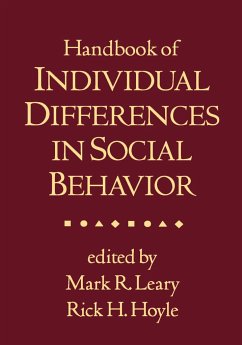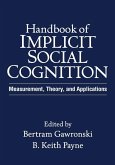Handbook of Individual Differences in Social Behavior
Herausgeber: Leary, Mark R; Hoyle, Rick H
Handbook of Individual Differences in Social Behavior
Herausgeber: Leary, Mark R; Hoyle, Rick H
- Gebundenes Buch
- Merkliste
- Auf die Merkliste
- Bewerten Bewerten
- Teilen
- Produkt teilen
- Produkterinnerung
- Produkterinnerung
How do individual differences interact with situational factors to shape social behavior? Are people with certain traits more likely to form lasting marriages; experience test-taking anxiety; break the law; feel optimistic about the future? This handbook provides a comprehensive, authoritative examination of the full range of personality variables associated with interpersonal judgment, behavior, and emotion. The contributors are acknowledged experts who have conducted influential research on the constructs they address. Chapters discuss how each personality attribute is conceptualized and…mehr
Andere Kunden interessierten sich auch für
![Biology of Personality and Individual Differences Biology of Personality and Individual Differences]() Biology of Personality and Individual Differences87,99 €
Biology of Personality and Individual Differences87,99 €![Handbook of Individual Differences in Cognition Handbook of Individual Differences in Cognition]() Aleksandra Gruszka / Gerald Matthews / Blazej Szymura (Hrsg.)Handbook of Individual Differences in Cognition152,99 €
Aleksandra Gruszka / Gerald Matthews / Blazej Szymura (Hrsg.)Handbook of Individual Differences in Cognition152,99 €![Chess and Individual Differences Chess and Individual Differences]() Angel BlanchChess and Individual Differences122,99 €
Angel BlanchChess and Individual Differences122,99 €![Methodological and Statistical Advances in the Study of Individual Differences Methodological and Statistical Advances in the Study of Individual Differences]() Methodological and Statistical Advances in the Study of Individual Differences39,99 €
Methodological and Statistical Advances in the Study of Individual Differences39,99 €![Handbook of Self-Regulation Handbook of Self-Regulation]() Handbook of Self-Regulation92,99 €
Handbook of Self-Regulation92,99 €![Handbook of Implicit Social Cognition Handbook of Implicit Social Cognition]() Handbook of Implicit Social Cognition120,99 €
Handbook of Implicit Social Cognition120,99 €![Handbook of Self-Enhancement and Self-Protection Handbook of Self-Enhancement and Self-Protection]() Handbook of Self-Enhancement and Self-Protection120,99 €
Handbook of Self-Enhancement and Self-Protection120,99 €-
-
-
How do individual differences interact with situational factors to shape social behavior? Are people with certain traits more likely to form lasting marriages; experience test-taking anxiety; break the law; feel optimistic about the future? This handbook provides a comprehensive, authoritative examination of the full range of personality variables associated with interpersonal judgment, behavior, and emotion. The contributors are acknowledged experts who have conducted influential research on the constructs they address. Chapters discuss how each personality attribute is conceptualized and assessed, review the strengths and limitations of available measures (including child and adolescent measures, when available), present important findings related to social behavior, and identify directions for future study.
Produktdetails
- Produktdetails
- Verlag: Guilford Publications
- Seitenzahl: 624
- Erscheinungstermin: 1. Juni 2009
- Englisch
- Abmessung: 260mm x 186mm x 35mm
- Gewicht: 1303g
- ISBN-13: 9781593856472
- ISBN-10: 1593856474
- Artikelnr.: 26021190
- Herstellerkennzeichnung
- Libri GmbH
- Europaallee 1
- 36244 Bad Hersfeld
- gpsr@libri.de
- Verlag: Guilford Publications
- Seitenzahl: 624
- Erscheinungstermin: 1. Juni 2009
- Englisch
- Abmessung: 260mm x 186mm x 35mm
- Gewicht: 1303g
- ISBN-13: 9781593856472
- ISBN-10: 1593856474
- Artikelnr.: 26021190
- Herstellerkennzeichnung
- Libri GmbH
- Europaallee 1
- 36244 Bad Hersfeld
- gpsr@libri.de
Mark R. Leary, PhD, is Professor Emeritus of Psychology and Neuroscience at Duke University. His research focuses on the processes by which people think about and evaluate themselves; the effects of self-reflection on emotion and psychological well-being; and how people are influenced by concerns about how they are perceived and evaluated by others. He is a Fellow of the American Psychological Association, the Association for Psychological Science, and the Society for Personality and Social Psychology, and a recipient of the Lifetime Career Award from the International Society for Self and Identity. Dr. Leary was the founding editor of the journal Self and Identity and is currently Editor of Personality and Social Psychology Review Rick H. Hoyle, PhD, is Professor of Psychology and Neuroscience at Duke University. The primary focus of his research is the investigation of basic cognitive, affective, and social processes relevant to self-regulation. He is a Fellow of the American Psychological Association, the Association for Psychological Science, the Society for the Psychological Study of Social Issues, and the Division of Evaluation, Measurement, and Statistics of the American Psychological Association.
Introduction 1. Situations
Dispositions
and the Study of Social Behavior
Mark R. Leary and Rick H. Hoyle 2. Methods for the Study of Individual Differences in Social Behavior
Rick H. Hoyle and Mark R. Leary II. Interpersonal Dispositions 3. Extraversion
Joshua Wilt and William Revelle 4. Agreeableness
William G. Graziano and RenÃ(c)e M. Tobin 5. Attachment Styles
Phillip R. Shaver and Mario Mikulincer 6. Interpersonal Dependency
Robert F. Bornstein 7. Machiavellianism
Daniel N. Jones and Delroy L. Paulhus 8. Gender Identity
Wendy Wood and Alice H. Eagly III. Emotional Dispositions 9. Neuroticism
Thomas A. Widiger 10. Happiness
Ed Diener
Pelin Kesebir
and William Tov 11. Depression
Patrick H. Finan
Howard Tennen
and Alex J. Zautra 12. Social Anxiousness
Shyness
and Embarrassability
Rowland S. Miller 13. Proneness to Shame and Proneness to Guilt
June Price Tangney
Kerstin Youman
and Jeffrey Stuewig 14. Hostility and Proneness to Anger
John C. Barefoot and Stephen H. Boyle 15. Loneliness
John T. Cacioppo and Louise C. Hawkley 16. Affect Intensity
Randy C. Larsen IV. Cognitive Dispositions 17. Openness to Experience
Robert R. McCrae and Angelina R. Sutin 18. Locus of Control and Attributional Style
Adrian Furnham 19. Belief in a Just World
Claudia Dalbert 20. Authoritarianism and Dogmatism
John Duckitt 21. The Need for Cognition
Richard E. Petty
Pablo Briñol
Chris Loersch
and Michael J. McCaslin 22. Optimism
Charles S. Carver and Michael F. Scheier 23. The Need for Cognitive Closure
Arie W. Kruglanski and Shira Fishman 24. Integrative Complexity
Peter Suedfeld V. Motivational Dispositions 25. Conscientiousness
Brent W. Roberts
Joshua J. Jackson
Jennifer V. Fayard
Grant Edmonds
and Jenna Meints 26. Achievement Motivation
David E. Conroy
Andrew J. Elliot
and Todd M. Thrash 27. Belonging Motivation
Mark R. Leary and Kristine M. Kelly 28. Affiliation Motivation
Craig A. Hill 29. Power Motivation
Eugene M. Fodor 30. Social Desirability
Ronald R. Holden and Jennifer Passey 31. Sensation Seeking
Marvin Zuckerman 32. Rejection Sensitivity
Rainer Romero-Canyas
Vanessa T. Anderson
Kavita S. Reddy
and Geraldine Downey 33. Psychological Defensiveness: Repression
Blunting
and Defensive Pessimism
Julie K. Norem VI. Self-Related Dispositions 34. Private and Public Self-Consciousness
Allan Fenigstein 35. Independent
Relational
and CollectiveâEUR"Interdependent Self-Construals
Susan E. Cross
Erin E. Hardin
and Berna Gercek Swing 36. Self-Esteem
Jennifer K. Bosson and William B. Swann
Jr. 37. Narcissism
Frederick Rhodewalt and Benjamin Peterson 38. Self-Compassion
Kristin Neff 39. Self-Monitoring
Paul T. Fuglestad and Mark Snyder
Dispositions
and the Study of Social Behavior
Mark R. Leary and Rick H. Hoyle 2. Methods for the Study of Individual Differences in Social Behavior
Rick H. Hoyle and Mark R. Leary II. Interpersonal Dispositions 3. Extraversion
Joshua Wilt and William Revelle 4. Agreeableness
William G. Graziano and RenÃ(c)e M. Tobin 5. Attachment Styles
Phillip R. Shaver and Mario Mikulincer 6. Interpersonal Dependency
Robert F. Bornstein 7. Machiavellianism
Daniel N. Jones and Delroy L. Paulhus 8. Gender Identity
Wendy Wood and Alice H. Eagly III. Emotional Dispositions 9. Neuroticism
Thomas A. Widiger 10. Happiness
Ed Diener
Pelin Kesebir
and William Tov 11. Depression
Patrick H. Finan
Howard Tennen
and Alex J. Zautra 12. Social Anxiousness
Shyness
and Embarrassability
Rowland S. Miller 13. Proneness to Shame and Proneness to Guilt
June Price Tangney
Kerstin Youman
and Jeffrey Stuewig 14. Hostility and Proneness to Anger
John C. Barefoot and Stephen H. Boyle 15. Loneliness
John T. Cacioppo and Louise C. Hawkley 16. Affect Intensity
Randy C. Larsen IV. Cognitive Dispositions 17. Openness to Experience
Robert R. McCrae and Angelina R. Sutin 18. Locus of Control and Attributional Style
Adrian Furnham 19. Belief in a Just World
Claudia Dalbert 20. Authoritarianism and Dogmatism
John Duckitt 21. The Need for Cognition
Richard E. Petty
Pablo Briñol
Chris Loersch
and Michael J. McCaslin 22. Optimism
Charles S. Carver and Michael F. Scheier 23. The Need for Cognitive Closure
Arie W. Kruglanski and Shira Fishman 24. Integrative Complexity
Peter Suedfeld V. Motivational Dispositions 25. Conscientiousness
Brent W. Roberts
Joshua J. Jackson
Jennifer V. Fayard
Grant Edmonds
and Jenna Meints 26. Achievement Motivation
David E. Conroy
Andrew J. Elliot
and Todd M. Thrash 27. Belonging Motivation
Mark R. Leary and Kristine M. Kelly 28. Affiliation Motivation
Craig A. Hill 29. Power Motivation
Eugene M. Fodor 30. Social Desirability
Ronald R. Holden and Jennifer Passey 31. Sensation Seeking
Marvin Zuckerman 32. Rejection Sensitivity
Rainer Romero-Canyas
Vanessa T. Anderson
Kavita S. Reddy
and Geraldine Downey 33. Psychological Defensiveness: Repression
Blunting
and Defensive Pessimism
Julie K. Norem VI. Self-Related Dispositions 34. Private and Public Self-Consciousness
Allan Fenigstein 35. Independent
Relational
and CollectiveâEUR"Interdependent Self-Construals
Susan E. Cross
Erin E. Hardin
and Berna Gercek Swing 36. Self-Esteem
Jennifer K. Bosson and William B. Swann
Jr. 37. Narcissism
Frederick Rhodewalt and Benjamin Peterson 38. Self-Compassion
Kristin Neff 39. Self-Monitoring
Paul T. Fuglestad and Mark Snyder
Introduction 1. Situations
Dispositions
and the Study of Social Behavior
Mark R. Leary and Rick H. Hoyle 2. Methods for the Study of Individual Differences in Social Behavior
Rick H. Hoyle and Mark R. Leary II. Interpersonal Dispositions 3. Extraversion
Joshua Wilt and William Revelle 4. Agreeableness
William G. Graziano and RenÃ(c)e M. Tobin 5. Attachment Styles
Phillip R. Shaver and Mario Mikulincer 6. Interpersonal Dependency
Robert F. Bornstein 7. Machiavellianism
Daniel N. Jones and Delroy L. Paulhus 8. Gender Identity
Wendy Wood and Alice H. Eagly III. Emotional Dispositions 9. Neuroticism
Thomas A. Widiger 10. Happiness
Ed Diener
Pelin Kesebir
and William Tov 11. Depression
Patrick H. Finan
Howard Tennen
and Alex J. Zautra 12. Social Anxiousness
Shyness
and Embarrassability
Rowland S. Miller 13. Proneness to Shame and Proneness to Guilt
June Price Tangney
Kerstin Youman
and Jeffrey Stuewig 14. Hostility and Proneness to Anger
John C. Barefoot and Stephen H. Boyle 15. Loneliness
John T. Cacioppo and Louise C. Hawkley 16. Affect Intensity
Randy C. Larsen IV. Cognitive Dispositions 17. Openness to Experience
Robert R. McCrae and Angelina R. Sutin 18. Locus of Control and Attributional Style
Adrian Furnham 19. Belief in a Just World
Claudia Dalbert 20. Authoritarianism and Dogmatism
John Duckitt 21. The Need for Cognition
Richard E. Petty
Pablo Briñol
Chris Loersch
and Michael J. McCaslin 22. Optimism
Charles S. Carver and Michael F. Scheier 23. The Need for Cognitive Closure
Arie W. Kruglanski and Shira Fishman 24. Integrative Complexity
Peter Suedfeld V. Motivational Dispositions 25. Conscientiousness
Brent W. Roberts
Joshua J. Jackson
Jennifer V. Fayard
Grant Edmonds
and Jenna Meints 26. Achievement Motivation
David E. Conroy
Andrew J. Elliot
and Todd M. Thrash 27. Belonging Motivation
Mark R. Leary and Kristine M. Kelly 28. Affiliation Motivation
Craig A. Hill 29. Power Motivation
Eugene M. Fodor 30. Social Desirability
Ronald R. Holden and Jennifer Passey 31. Sensation Seeking
Marvin Zuckerman 32. Rejection Sensitivity
Rainer Romero-Canyas
Vanessa T. Anderson
Kavita S. Reddy
and Geraldine Downey 33. Psychological Defensiveness: Repression
Blunting
and Defensive Pessimism
Julie K. Norem VI. Self-Related Dispositions 34. Private and Public Self-Consciousness
Allan Fenigstein 35. Independent
Relational
and CollectiveâEUR"Interdependent Self-Construals
Susan E. Cross
Erin E. Hardin
and Berna Gercek Swing 36. Self-Esteem
Jennifer K. Bosson and William B. Swann
Jr. 37. Narcissism
Frederick Rhodewalt and Benjamin Peterson 38. Self-Compassion
Kristin Neff 39. Self-Monitoring
Paul T. Fuglestad and Mark Snyder
Dispositions
and the Study of Social Behavior
Mark R. Leary and Rick H. Hoyle 2. Methods for the Study of Individual Differences in Social Behavior
Rick H. Hoyle and Mark R. Leary II. Interpersonal Dispositions 3. Extraversion
Joshua Wilt and William Revelle 4. Agreeableness
William G. Graziano and RenÃ(c)e M. Tobin 5. Attachment Styles
Phillip R. Shaver and Mario Mikulincer 6. Interpersonal Dependency
Robert F. Bornstein 7. Machiavellianism
Daniel N. Jones and Delroy L. Paulhus 8. Gender Identity
Wendy Wood and Alice H. Eagly III. Emotional Dispositions 9. Neuroticism
Thomas A. Widiger 10. Happiness
Ed Diener
Pelin Kesebir
and William Tov 11. Depression
Patrick H. Finan
Howard Tennen
and Alex J. Zautra 12. Social Anxiousness
Shyness
and Embarrassability
Rowland S. Miller 13. Proneness to Shame and Proneness to Guilt
June Price Tangney
Kerstin Youman
and Jeffrey Stuewig 14. Hostility and Proneness to Anger
John C. Barefoot and Stephen H. Boyle 15. Loneliness
John T. Cacioppo and Louise C. Hawkley 16. Affect Intensity
Randy C. Larsen IV. Cognitive Dispositions 17. Openness to Experience
Robert R. McCrae and Angelina R. Sutin 18. Locus of Control and Attributional Style
Adrian Furnham 19. Belief in a Just World
Claudia Dalbert 20. Authoritarianism and Dogmatism
John Duckitt 21. The Need for Cognition
Richard E. Petty
Pablo Briñol
Chris Loersch
and Michael J. McCaslin 22. Optimism
Charles S. Carver and Michael F. Scheier 23. The Need for Cognitive Closure
Arie W. Kruglanski and Shira Fishman 24. Integrative Complexity
Peter Suedfeld V. Motivational Dispositions 25. Conscientiousness
Brent W. Roberts
Joshua J. Jackson
Jennifer V. Fayard
Grant Edmonds
and Jenna Meints 26. Achievement Motivation
David E. Conroy
Andrew J. Elliot
and Todd M. Thrash 27. Belonging Motivation
Mark R. Leary and Kristine M. Kelly 28. Affiliation Motivation
Craig A. Hill 29. Power Motivation
Eugene M. Fodor 30. Social Desirability
Ronald R. Holden and Jennifer Passey 31. Sensation Seeking
Marvin Zuckerman 32. Rejection Sensitivity
Rainer Romero-Canyas
Vanessa T. Anderson
Kavita S. Reddy
and Geraldine Downey 33. Psychological Defensiveness: Repression
Blunting
and Defensive Pessimism
Julie K. Norem VI. Self-Related Dispositions 34. Private and Public Self-Consciousness
Allan Fenigstein 35. Independent
Relational
and CollectiveâEUR"Interdependent Self-Construals
Susan E. Cross
Erin E. Hardin
and Berna Gercek Swing 36. Self-Esteem
Jennifer K. Bosson and William B. Swann
Jr. 37. Narcissism
Frederick Rhodewalt and Benjamin Peterson 38. Self-Compassion
Kristin Neff 39. Self-Monitoring
Paul T. Fuglestad and Mark Snyder








